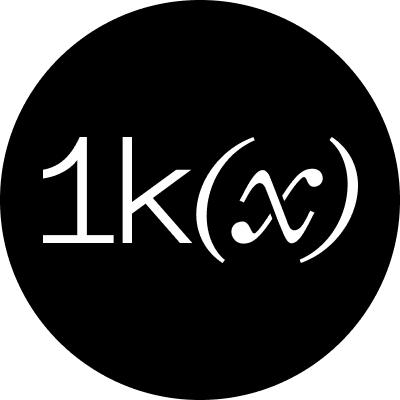
Wei Dai
@_weidai
Followers
16K
Following
6K
Media
249
Statuses
3K
Research Partner @1kxnetwork. CS PhD @UCSanDiego. Research & investing for the future of crypto. Alpha in highlights. Personal opinion, not investment advice.
Joined November 2021
1/ Why I'm excited about investing in crypto infra 🧵 Crypto and trust-minimizing technologies will transform foundational infrastructures across industries. As an ex-academic and now investor, I strive to find, fund, and partner with 0-to-1 innovators and 10x disruptors.
75
16
349
In Buenos Aires until next Friday. If you believe you are ambitious enough and building something cool, DM me. I will be selectively meeting new projects. Catch me at: - Ethereum Cypherpunk Congress - Encryption Day - Trustless Agent Day
15
3
159
Only 3 in 10 Veterans know about 0% down home loans. Join our mission to help veterans find their way home.
3
17
68
We're hosting this event next week for @EFDevcon in Buenos Aires. + Actively leading rounds! (we're the most active we've been this year) Amidst the market chaos, we continue to show up ready to catchup with our network and meet new community members. Me and our team included:
14
5
69
Looking forward to speaking on the "Why Should We Trust Agents" panel. Crypto will bring value to AI-powered products, but where exactly that is not obvious. You bet I will be first to call out bullshit in crypto x AI.
What if agentic economies were open, interoperable and human-first? Join Trustless Agent Day. For pioneers, builders & researchers building the foundations of a new Internet. Hosted by @Coinbase, @GoogleCloud, @EthereumFndn and @MetaMask Nov 21st, La Rural Agenda is live.👇
9
0
27
We (@1kxnetwork) are honored to be an early supporter of Seismic. Congrats to @lyronctk and team. We look forward to what you will ship next!
3
1
60
United in Privacy: @_weidai x @1kxnetwork Explore: https://t.co/tmQC59hroB Register: https://t.co/yiez9mVBVA
1
3
5
There are two types of success stories (in crypto and beyond). The first type is those who learn and execute the playbook. This is easier said than done: it requires immense intelligence, resourcefulness, and adaptability. The second type is those who execute guided by their
17
9
97
𝐓𝐡𝐞 𝐏𝐫𝐢𝐯𝐚𝐜𝐲 𝐒𝐚𝐥𝐨𝐧 speaker lineup✨ @_weidai is a Research Partner at @1kxnetwork and cryptographer who has designed, shipped, and invested in privacy protocols.
Introducing 𝐓𝐡𝐞 𝐏𝐫𝐢𝐯𝐚𝐜𝐲 𝐒𝐚𝐥𝐨𝐧 – happening at @EFDevcon on Nov 17th A new type of gathering. Curated alongside leading teams, and bringing together top minds to discuss privacy's hardest problems 16 lightning talks, and a special surprise🐇 https://t.co/S3H9QyDyZc
15
7
76
We’re excited to share that Lagrange is building in @anduriltech 's Lattice SDK environment to deliver real-time, verifiable AI for defense workflows. This is an important milestone for applying ZK proofs to mission-critical AI systems for cryptographic supremacy. Learn more🧵
13
14
229
Worth a read and a listen if you need talking points on why crypto in your upcoming holiday gatherings Fees ↑ Value accrual ↑ Protocols generating fees ↑
@lalleclausen @FintechTvGlobal 📊 Read the report: https://t.co/LQ28VdDUiy 🎥 Watch the full segment: https://t.co/sNBdeth7Cv Data, not hype — onchain revenue is redefining what real value creation looks like. Let’s make the onchain economy more visible—share if you agree.
5
0
18
Since privacy is top of mind, my article on privacy from 3.5 years ago is still very much relevant and a good introductory read. It gives: - a simple framework for different types of privacy (anonymity vs confidentiality, & privacy from whom) - a landscape of technologies that
Want to know why ZK is not the (full) end-game solution to privacy on public blockchains and how threshold (F)HE can help? Don't know what ZK/FHE means but want to know more about privacy on public blockchains? Read my post to find out! https://t.co/NZoSgb210n
9
8
65
I want to expand a bit on this 👇 > its a sign of industry maturity that good tech is being recognized and creates memetic narratives. > my vision for @zksync though is to be much more than good tech. i want us to be an an amazing business that enables other businesses to build
ZEC up ~1000% over 2 months ZK up ~100% over 2 days Tech coins are making a comeback The world is healing
14
16
114
Contrary to popular belief, sometimes tech does matter, as it unlocks novel products that would otherwise be impossible. Not saying this is responsible for the price movement, but all four projects build zk validiums: - ZKsync Prividiums - Scroll Cloak - Mina zkApps - Starkware
So after the crazy $ZEC run, degens out there are now pumping every random ecosystem with some kind of zk tech underneath? Literally nothing is happening on zkSync, Mina Protocol, Scroll, Starknet, or any of the others, nor does anyone care about these chains. It’s a pure
16
25
137
ZEC up ~1000% over 2 months ZK up ~100% over 2 days Tech coins are making a comeback The world is healing
53
31
374
Onchain privacy is like nuclear physics. Onchain privacy can empower individuals and be positive-sum like nuclear energy, or empower nation-states like nuclear weapons. Onchain privacy will shape how the world evolves in this century, just as nuclear physics did in the last.
At the DC Privacy Summit, @_weidai called onchain privacy a "dual-use technology" like nuclear physics.
26
10
99
As a crypto project, you are building two products: 1. The token (that accrues value) 2. The core product (that generates value) Having a clear mental separation between the two allows you to think clearly about ways to make these two products synergistic.
65
47
370
Crypto is maturing Fees ↑ Value accrual ↑ Protocols generating fees↑ Tokens will eat the world For more details, take a look at our 2025 revenue report👇
We @1kxnetwork just released the most extensive report on monetization of the crypto industry to date: The 1kx Onchain Revenue Report (H1 '25) aggregates verified onchain fee data across 1,200+ protocols - mapping where users pay, how value flows, and which sectors are driving
8
2
61
I’ve been in crypto for over a decade, and one question from outsiders and skeptics kept being asked: “What is the value that crypto provides?” We at 1kx are trying to answer this question once and for all: by surfacing onchain fees as the best indicator of repeatable utility
We @1kxnetwork just released the most extensive report on monetization of the crypto industry to date: The 1kx Onchain Revenue Report (H1 '25) aggregates verified onchain fee data across 1,200+ protocols - mapping where users pay, how value flows, and which sectors are driving
14
7
68











